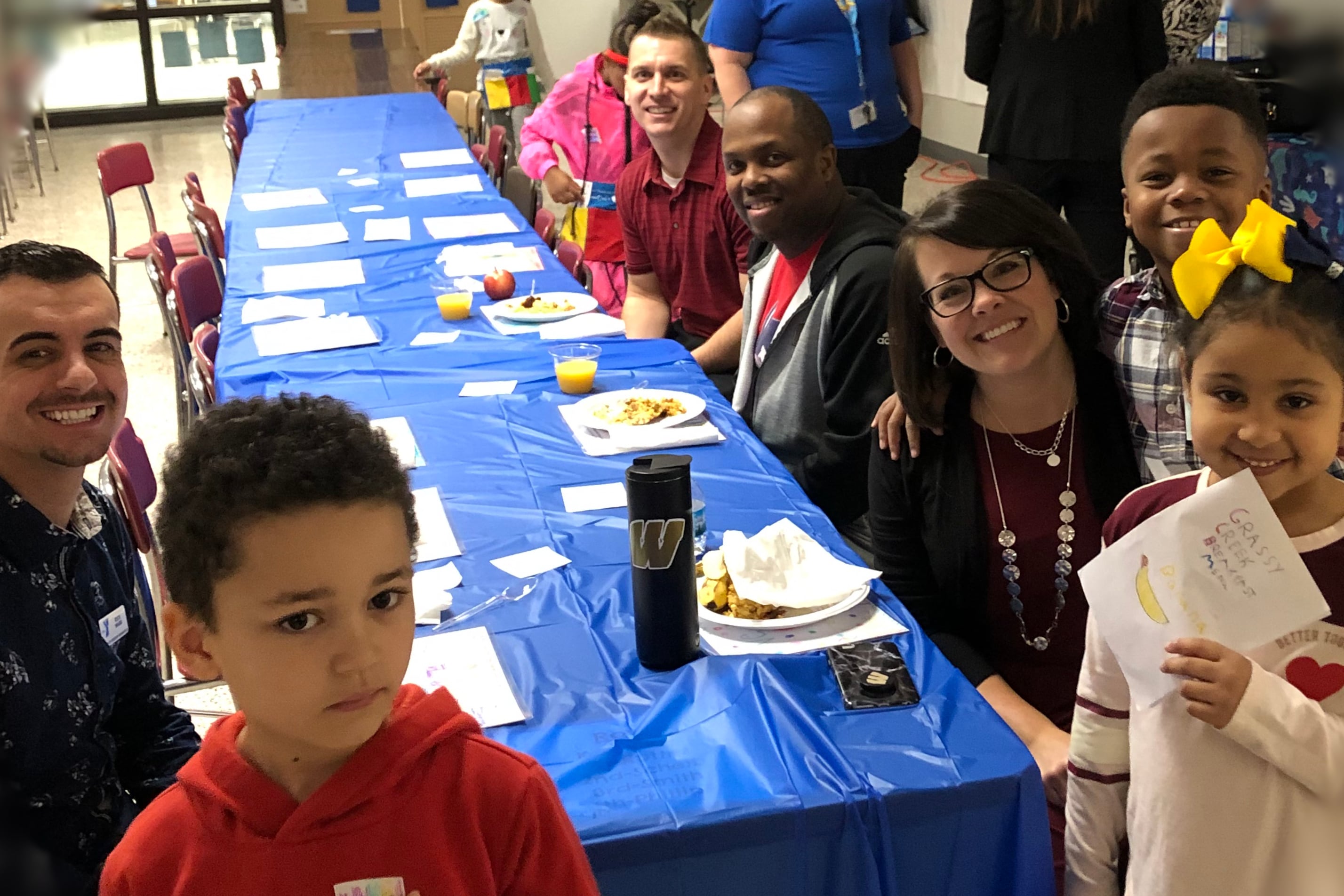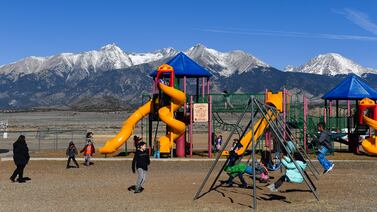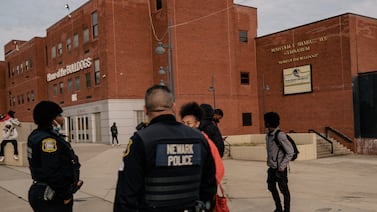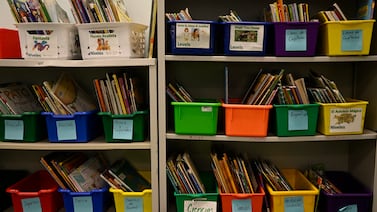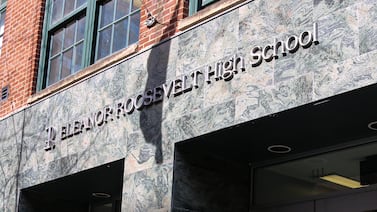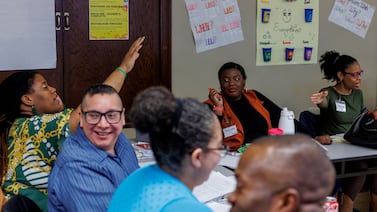Shortly after Christy Merchant became the principal at Grassy Creek Elementary School in Indianapolis, her leadership team met to discuss a problem: They had too many students with too many suspensions.
And Black boys were bearing the brunt of the punishments.
That’s when the Warren Township school started an equity team. It launched new staff training and reset its goals to focus on students of color.
“When we started focusing on the amazing things our children can do, our mindset shifted from punitive to positive, too,” Merchant said.
As a result, Grassy Creek has reduced disciplinary referrals by more than 75% over the past five years, Merchant said. The school added Black history lessons into morning announcements and formed an African-American Parents Council.
Grassy Creek was recently named a Blue Ribbon School by the U.S. Department of Education in recognition of its efforts to close racial gaps. Merchant spoke to Chalkbeat about reducing discipline disparities, her rural upbringing and journey into urban education, and learning to let go of white guilt.
This interview has been lightly edited for length and clarity.
What are you doing to close racial disparities in discipline at your school?
As a school staff with majority white team members, we started with learning about the history of race in the United States and the role it plays in public education today. We dug into our school data and had the hard conversation about office referrals. Is a rough day in kindergarten really something that should stick to a child’s school file through their senior year, ultimately winding up part of a college application? Is a suspension as an 8-year-old going to build bridges with their family so we can work as a team to support the child’s improvement and ultimately get them to high school graduation?
Granted, there are times when poor choices lead to tough consequences. But we started looking at how we, the adults, can support children through improved engagement strategies, teaching expectations, setting goals, and following through with positive feedback.
As the adults, we must provide our children with a learning environment that honors their culture and personalities, not aligns with our own personal experiences — because very few of us have similar experiences to our students, a harsh reality of public education.
After nearly a year of upheaval — and in some cases grief and trauma — there’s been a lot of talk about the importance of social-emotional learning. Are you doing anything differently to account for what so many families have been through?
On top of daily lessons on emotional regulation, social skills, and behavior expectations, we had already added a formal curriculum to include positive self-talk, problem-solving, fair ways to play, empathy, and ways to calm down. Our students want to learn but often don’t have the regulation tools yet to do so successfully.
Throughout the pandemic, our social-emotional learning pieces have become part of our daily vocabulary, and many of our families have incorporated them at home, too. The challenges from COVID-19 also pushed us to review our communication practices and focus on attendance. We have an amazing community resource center now that opened last fall. Through the center, we can support families with rent assistance, food and clothing, tutoring or English language classes for parents, therapy services and classes for caregivers, and so much more.
What led you to a career in education?
As a child, my dad pushed me to work harder than everyone else. He worked in a factory during the day and multiple odd jobs at night to make ends meet. He didn’t want me to work as hard as he did every day and made it pretty clear when I was little that I was going to college.
When I started college, I thought I’d study medicine. However, in my sophomore year, I married a future PE teacher, and my eyes quickly turned to what brought him joy: teaching. I wanted that joy, too! I was fortunate to shadow a few elementary teachers, made a swift change to education, and haven’t looked back.
Still, I promised my dad I’d be a doctor. I’m about eight classes and a dissertation away from fulfilling that promise with a doctorate in education.
Tell us about your own experience with school and how it affects your work today.
I grew up in a little town with lots of corn fields and no cable (that was a big deal back then). It was a safe place but pretty limited in experiences. My parents taught me that nothing beats hard work, so that’s what I always did. I took the hardest classes and signed up for all the extracurricular activities offered. I was very fortunate to have positive people around me and found success in the classroom.
Today, I look at my students and we don’t have the same school experiences. I lead an urban school with my country school background. Our district is large in a big city, and my hometown was so small. My school today is diverse, and back home everybody looked like me. I knew everyone in all the grades as a kid, but my students don’t know each other outside of their teams.
Even with all of those differences, I think my childhood helped shape me in a way that affords me to honor our students and families. They work hard. They value their families. They want amazing experiences and people who support them. They want to see their children succeed and dreams fulfilled. Those are the same things my parents wanted for me on our gravel road decades ago.
What’s the best advice you ever received — and how have you put it into action?
“Choose one thing and do it well. Next year, choose something different. Keep doing the previous thing well and add on until you get it all together. But remember, nobody has it all together.”
My mentor teacher my first year out of college, Julie Kelly, told me something like this. That was 20 years ago and every year, I pull that nugget of truth out and pass it on to another newbie. We can’t stretch ourselves so thin that we don’t do anything well. I try to remind myself and my team that we can’t do it all today, but we can start with the first step.
What’s one thing you’ve read that has made you a better educator?
When I interviewed for my current position, I was searching for my place in public education. I had worked in suburban districts and rural ones, of various sizes. However, I finally found the sweet spot in urban education.
I quickly realized my lack of experiences were broad and deep despite my years of experience, especially when working with children and families of color. I read the book, “Waking Up White: and Finding Myself in the Story of Race” by Debby Irving that first summer. I desperately wanted to connect and serve my school community and not fall into the white savior trap.
This book taught me how to investigate history from many perspectives, to see how the past has shaped today for different individuals, and to let go of white guilt. Gosh, that guilt and fear of what to say or not to say will eat you up if you don’t move past it and just do something to demonstrate your heart for others. That book definitely put me into a mindset of action, and that’s had an impact on everything since. When I meet a person, especially an educator, starting on their own race journey, this is the first book I recommend.


